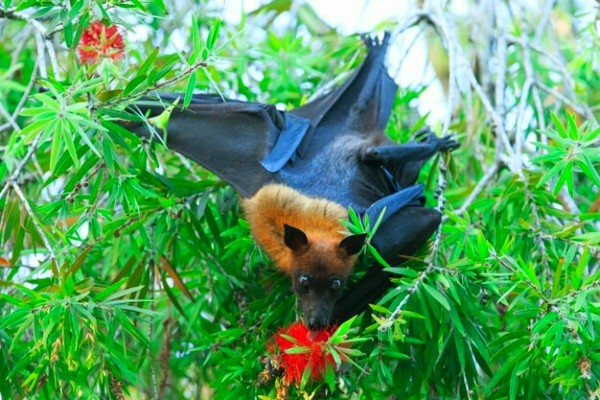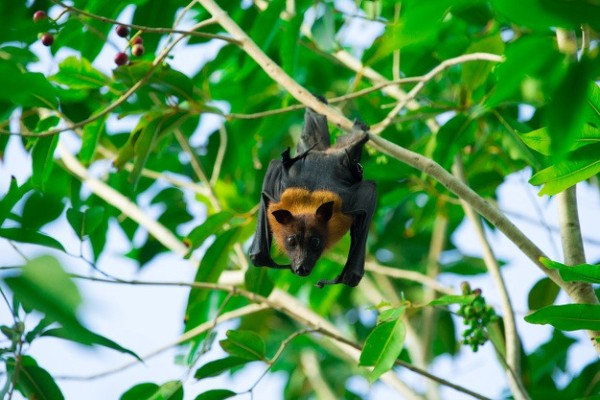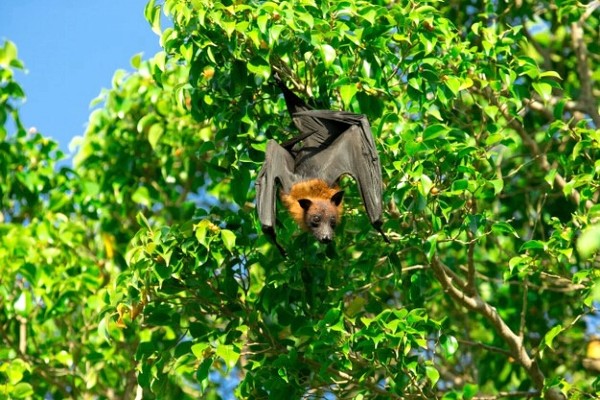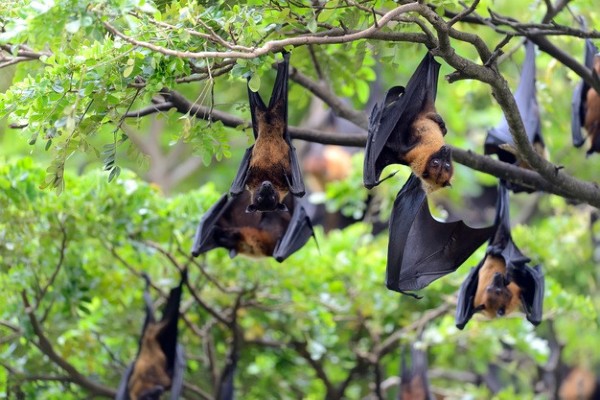Amazing facts about a fruit bat

Amazing facts about fruit bats, fruit bat is a type of bat that includes families of different sizes which vary
depending on where they originate. They are animals that have fairly good vision compared to other bats,
and they also have a very good sense of smell, which helps them avoid danger or find food.
Fruit bat attributes
The fruit bat has different characteristics depending on its place of origin, being able to vary in size
and even the shape of its wings, with interest in the species of fruit trees on which it feeds. Their wings
generally help them to fly despite the force of the wind.
These animals usually have fine, sharp teeth to be able to eat fruit, as well as very long tongues
that they use to feed themselves and then hide in the rib cage inside their bodies rather than in their mouths.
They have a good sense of tracking that they use to be able to find their food.
In addition, these senses also help them avoid all kinds of dangers.
Fruit bat
According to the Guardian, the fruit bat, from the class of flying foxes,
is the main carrier of the Nipah virus in nature, especially in China, Southeast Asia, New Guinea, and Australia.

Bats have a bad reputation for being associated with the spread of viruses, and according to a previous
study conducted by researchers from the University of “Cambridge”, they are among the largest
carriers of viruses, and expose humans to a large proportion of infection, because they often live close to it,
and they move thousands of kilometers during their flights that may It lasts several months.
The study adds that fruit bats can be home to many types of viruses, most notably the “Lagos”
virus and “myxoviruses”, and these viruses can be transmitted from bats to humans easily.
The danger of bats and their relationship to the spread of the virus
In a report, Viasna Duong, head of the virology unit at the Scientific Research Laboratory at the Pasteur I
nstitute in Cambodia, said fruit bats can fly up to 100 kilometers each night in search of fruit.
He added that this means that residents of the area need to be concerned not only about
getting too close to bats, but also about consuming products that may have been contaminated
by bats infected with the virus, one of which is Nipah.
Duong also identified another high-risk case where fruit bat dung has become a common fertilizer
in Cambodia and Thailand. For Cambodians, selling bat dung can be a vital means of making a living.
He noted that there are many locations where locals encourage fruit bats, also known as flying foxes,
to sit near their homes to collect and sell guano, while many of them do not know the dangers
they face in doing so, saying: “60 % of the people we interviewed did not know that bats transmit disease,
there is still a lack of knowledge in the community.”

you can read also: Is coconut a fruit useful?
Destruction of bat habitat causes the spread of ‘Nipah’ in the past
The destruction of the fruit bat habitat has also led to the spread of Nipah virus infection in the past.
In 1998, an outbreak of the Nipah virus in Malaysia killed more than 100 people,
and researchers concluded that forest fires and local drought pushed bats out of their
natural environment and forced them to head towards trees. Fruit is grown on farms that raise pigs.
read more: Are olives vegetables or fruits
Transmission of the virus from bats to humans
It turns out that fruit bat releases more viruses when under stress, indicating that it usually
allows the virus to pass from bats to pigs and onward to breeders.
Fruit bats tend to live in densely forested areas with lots of fruit trees to eat, and when their habitat is destroyed,
they find new solutions, such as sitting at home or on towers like in Angkor Wat.
Does getting rid of bats eliminate fears of Nipah?
Not unless we want to make things worse, says Tracy Goldstein, director of the One Health Institute lab,
explaining that bats have a very important ecological role, pollinating more than 500 plant species.
They also help control insects and play a very important role in disease control in humans,
for example, reducing malaria by eating mosquitoes, according to Goldstein.
He also pointed out that the extermination of bats has proven harmful from the perspective of disease and humans, stressing that this will make (humans) more vulnerable, as killing animals increases the risk.

Egyptian fruit bat
According to a previous study conducted by researchers from the University of Cambridge,
the Egyptian fruit bat is nocturnal, like other bats, as it spends daylight hours on trees or in caves,
which spreads in some parts of the continent of Africa and Asia, and inhabits highlands and lowlands as
long as it contains fruit trees that It provides him with the food he needs to live.
Fruit bats like to live in caves, but they don’t mind living in man-made places, such as tunnels, abandoned buildings, and debris.
The Egyptian fruit bat is nocturnal activity, like other bats, as it spends the daylight hours on trees or in caves, and lives in the form of large groups that may number up to several thousand sometimes. Kind of bat on many kinds of fruit, the fruits of wild palm.
read more: Is coconut a fruit useful?
Where do fruit bats live?
Fruit bats are intelligent and always tend to live near areas where you can find plenty of fruit and food. They are often found in very densely forested areas where there are trees with very abundant fruit. And They are animals that tend to live in hot climates, as there are usually many fruits in these climates.
They can also travel as much as necessary in some months of the year to find food, but they always come back to their own place to rest before the day’s holiday. In many cases, they will not have time to find any fruit.
read more: Amazing Benefits ancient fruit
What is the behavior of fruit bats?
As for the behavior of fruit bats, it is interesting that they are very clumsy when landing, but this is not because of their poor eyesight, but because they have a painful balance, and if they do not hit any tree, plant, wall, or any object, in many cases they cannot stop. As they are used to, they never hurt themselves in this kind of “forced landing”.
What do fruit bats eat?
Fruit bats, as their name suggests, are animals that feed on fruits and berries hanging from trees and shrubs. It is strange, but these animals do not eat all the fruits as most people think, but with the help of their own teeth, they crush the fruits and eat the nectar from them.
read more: Amazing benefits of Juicy Fruit Gum





